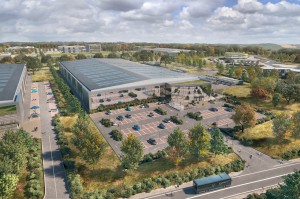Bath and the West of England will become the UK’s centre for electric vehicle technology when the long-expected green light is finally given for a battery gigafactory in Somerset, according to business leaders and politicians in the region.
The government this week agreed a deal with Tata Group, which owns Jaguar Land Rover (JLR), to build the massive production plant in the UK – with industry experts certain it will be sited on the Gravity business park now being developed on former industrial land near Bridgwater, pictured.
The £4bn factory will create around 4,000 direct jobs and an estimated further 3,500 in the supply chain, including at firms and training organisations based in Bristol.
The West of England is already a major player in sustainable fuels and green transport, with a number of organisations and businesses heavily involved in research and development for the sector, including the University of Bath’s £70m Institute for Advanced Automotive Propulsion Systems (IAAPS).
According to Phil Smith, managing director of Business West – the organisation that runs Bath Chamber of Commerce – the move will put the region at the forefront of the fast-growing low-carbon automotive revolution.
“The South West, with its ecosystem of economic, innovation, academic and infrastructure assets, is the ideal location for this major industrial investment,” said Mr Smith, pictured.
“The nearby universities of Bristol, UWE, Bath, Exeter and Cardiff means Gravity will have a pool of local talent it can work with to ensure the region plays an integral role in supporting young people to develop the right skills to further decarbonise our economy.
“This is the leading principal behind the Local Skills Improvement Plans (LSIPs), which Business West delivers in the West of England, and it will be fantastic to see employers and colleges working together to ensure employers are making use of these local skills.”
He said the gigafactory, which will supply JLR and Tata Motors from 2026, will drive forward the UK’s ambitions to decarbonise transport and support the country in its journey to net zero through advanced battery manufacturing.
West of England Metro Mayor Dan Norris, pictured, who leads the region’s combined authority, also welcomed the prospect of thousands of new green jobs – but said there must be a green transport plan alongside them.
“After so many false starts, if the deal is finally done, then this is fantastic news for the West of England,” he said. “It shows our region is leading the way as the best place to invest in net zero.
“Given the scale of the potential investment, we have a real opportunity to shape the green jobs revolution, not just here in the West, but nationally and internationally, to ensure these jobs of the future are high-quality, well-paid and unionised.”
However, the Labour mayor added that the lack of a coherent industrial strategy from the government that involved the regions meant the rail-connected site was set to only be accessible by road.”
Research by the combined authority suggested in the course of a working year, workers commuting by road alone could create 6,635 tonnes of CO2.
In addition, under the proposed plan, all of the materials to build the factory would be taken in by road, and when complete, all the components and finished products transported by lorry.
“A gigafactory is undeniably good news for the West, but we shouldn’t let that cloud the fact Britain is crying out for a proper industrial strategy,” Mayor Norris added.
“I am concerned the climate emergency has been overlooked. Is the plan really to bring in everything to build it by road and then create a high employment site reliant purely on cars, lorries and vans? The government must surely see the irony of green jobs that you can only access by road.”
Mayor Norris offered combined authority assistance with workforce training when he had face-to-face meetings with JLR last year. The authority is the regional body responsible for skills.
He added: “Brunel himself would have been proud of these manufacturing and engineering jobs and on top of this will be the impact of people recruited to work at the factory spending their wages in our local area, boosting local shops, restaurants, tourism and everything from salons to solicitors.”



















